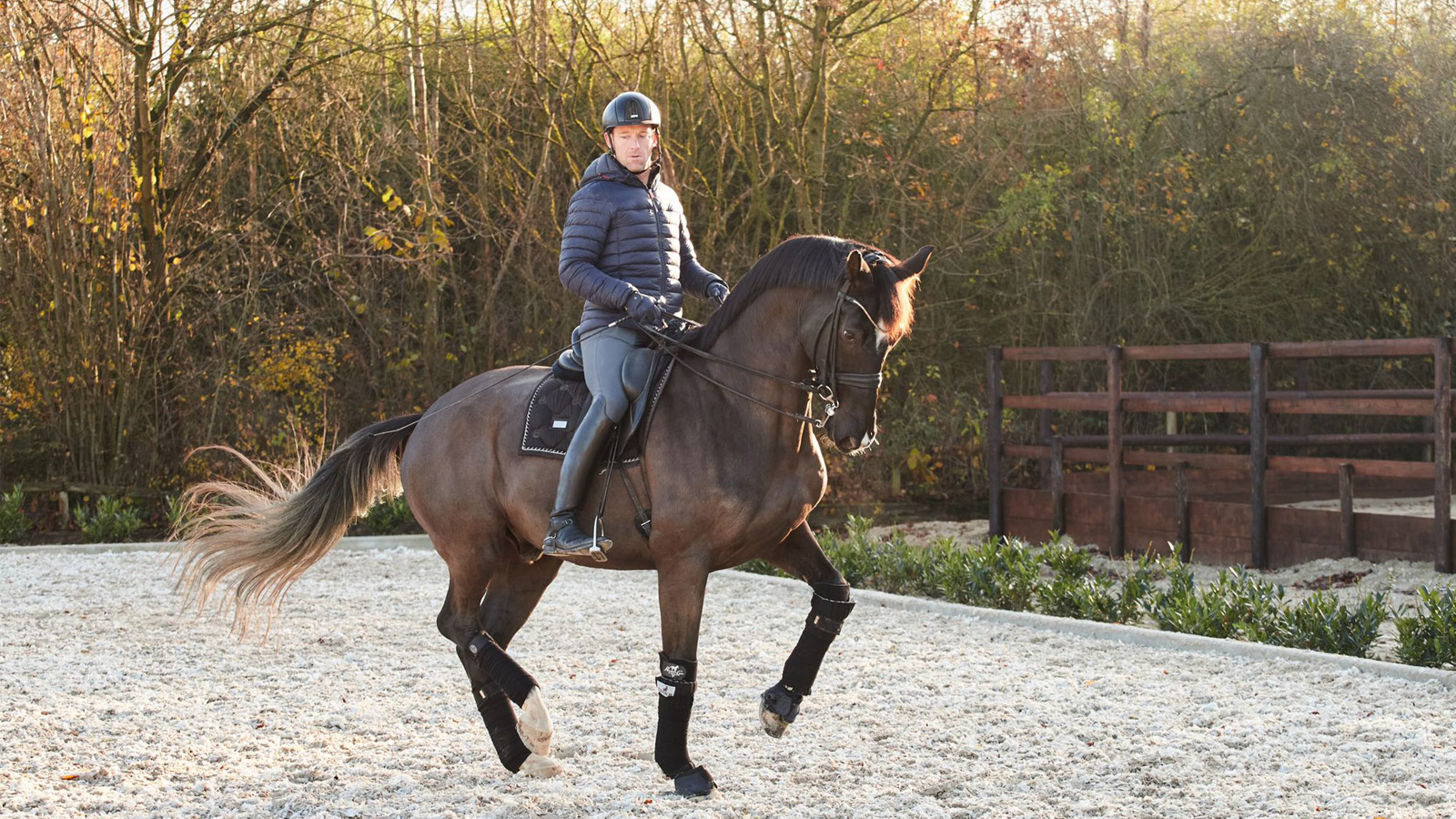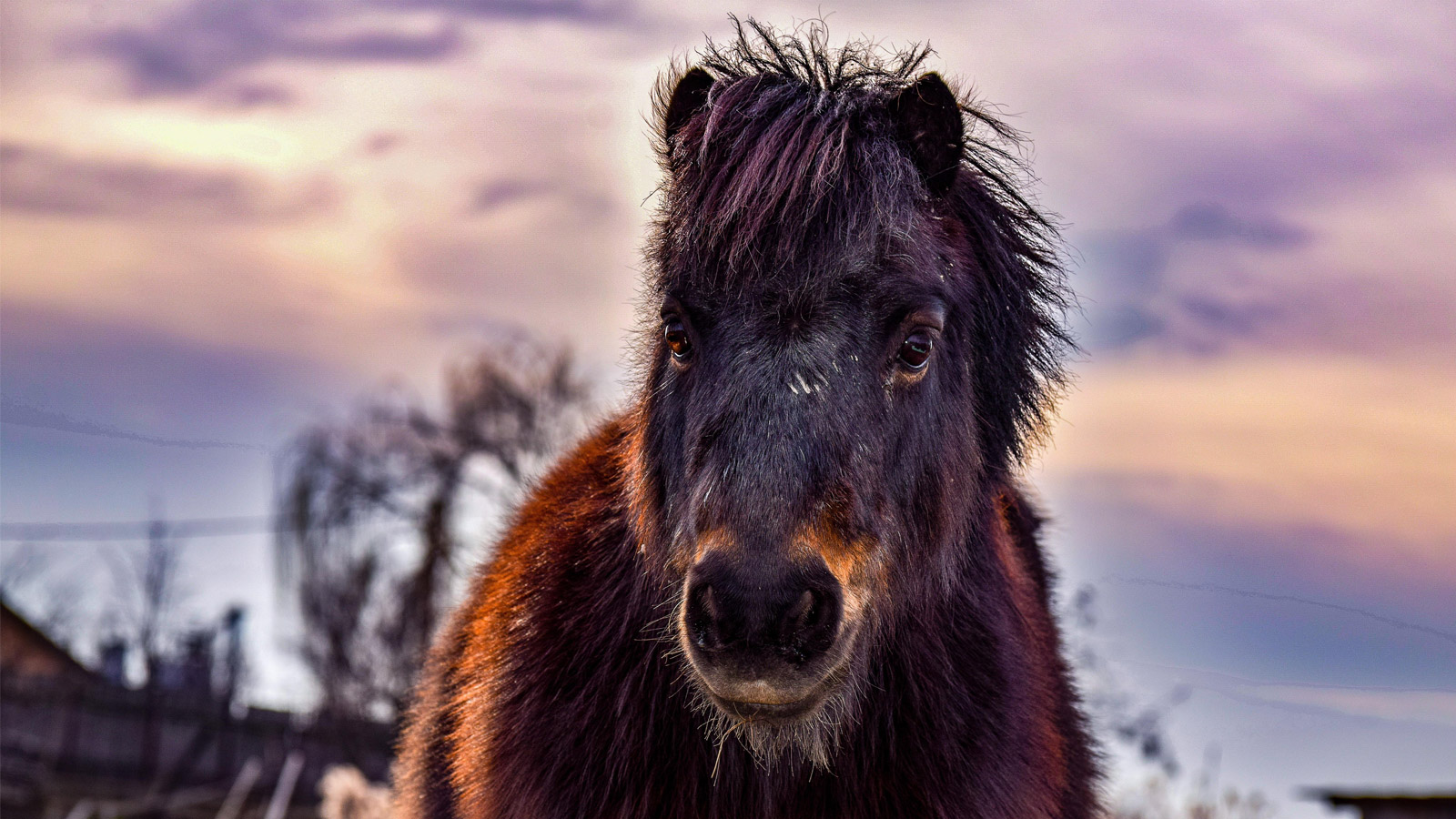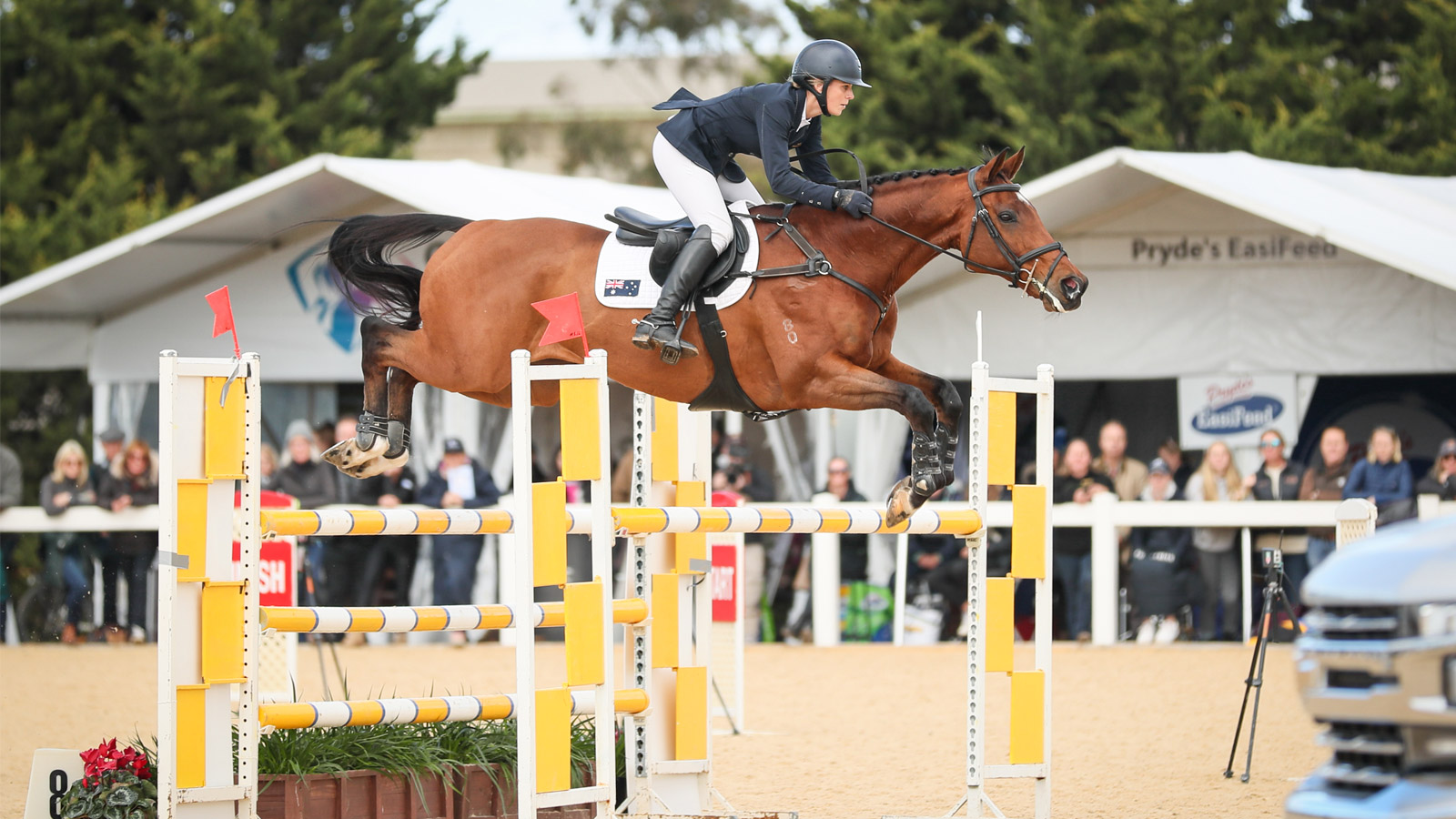When Warwick McLean left for England 12 years ago, little did he know he would eventually settle in Germany with his Finnish-born wife where they now run their own prestigious stables and he is in contention for the World Championships on his favourite horse, Hendrix 11.
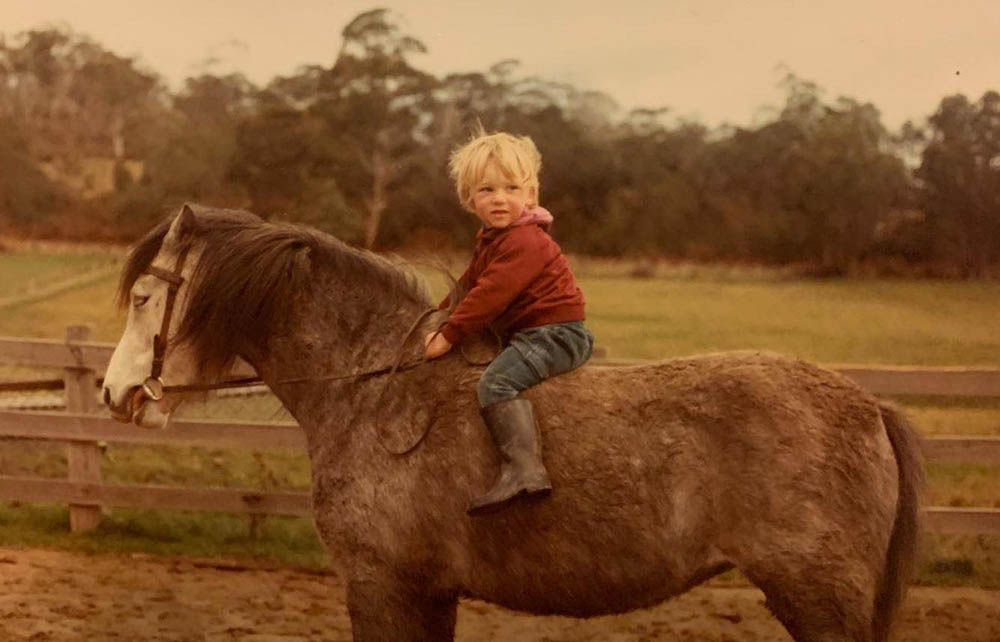
Warwick McLean was always destined for a career with horses!
After working his own way from the grass roots up, Aussie Warwick McLean has not only made a big impression in Europe with his McLean Reitsport business – his unique skills with difficult horses have put him in huge demand. With the business flourishing,he is now also making his mark in the Grand Prix arena and has been named on Australia’s nominated entries list with Hendrix 11 for the FEI World Championships next month – meaning he’s in contention for team selection. Here he tells us how it all came about.
ROGER: How long have you now been in Germany and what did you do initially?
WARWICK: I moved oved over to Europe in 2010 and actually started off in England to train with Kyra Kyrklund and Richard Weis with my horse Alessandro, and it’s where I met my future wife, Carolina. I was there for 18 months and started what was a great business there, but realised there was a gap between the really top riders and the bread-and-butter students. We wanted to experience other parts of Europe, so we then moved south of Sweden as my brother was in Copenhagen. It was not the place for us and so we moved to Germany in 2012 with Alessandro and another horse a friend had given to me, who was talented but so terribly horse-shy; we wanted to see how far we could get him.
Here we began working with “problem horses”; we started with 11 boxes and had 11 horses from Finland and Sweden. We were horse nerds who wanted to see how the business of training horses would go; our plan was to build the business so it could in turn support us to develop as riders. We saw lots of people at shows and I often saw people having trouble with horses not loading and just could not help myself from assisting, and the business grew amazingly quickly. We were surprised as to the niche that we were to enter.
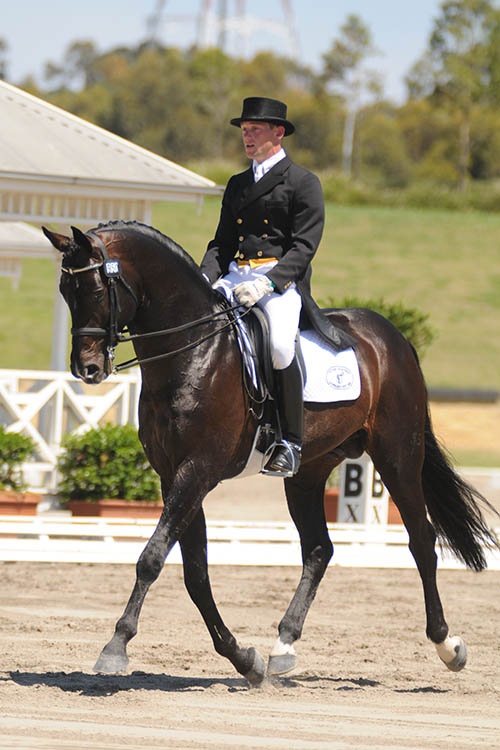
Warwick riding Alessandro at the Australian Dressage Championships in 2008; in 2010, he took the horse to Europe to train.
ROGER: Who have you been training with and does the attitude and training seem different to what you had in Australia?
WARWICK: I have grown a lot over the years. My wife and I are a great team and without her I wouldn’t be where I am now. It goes without saying that she has been a huge influence on my riding, as is mine to her, and we help each other on a day-to-day basis.
My influences have been varied and we originally trained with Kyra Kyrklund and Richard Weis in England, where we learnt to ride with feeling. This is in company with my father’s methods and understanding on training and the way horses learn, which has had a great influence. This had led us on to many things and now for the last five years we have been training with Morten Thomsen, as his concepts on training resonate with us. His concept on teaching the horses from really simple things is so great. He is a modest person and helps many top riders, including Benjamin and Jessica Werndl.
The various horses we’ve trained from high profile riders such as Jonny Hilberath and Isabell Werth and the like has meant we see many methods and ways of going. There are many varied horses that are here for sale and the ways around every horse is different. It is a constant learning procedure… and what’s interesting is the more you do, the more you realise the simplistic way is the best.
The training here compared to other countries and Australia is that it is perhaps a little more systematic. The standard here is very high and there’s the tradition of bringing in structured basics earlier with young riders, beginning on the lunge and then with ponies that are well trained.
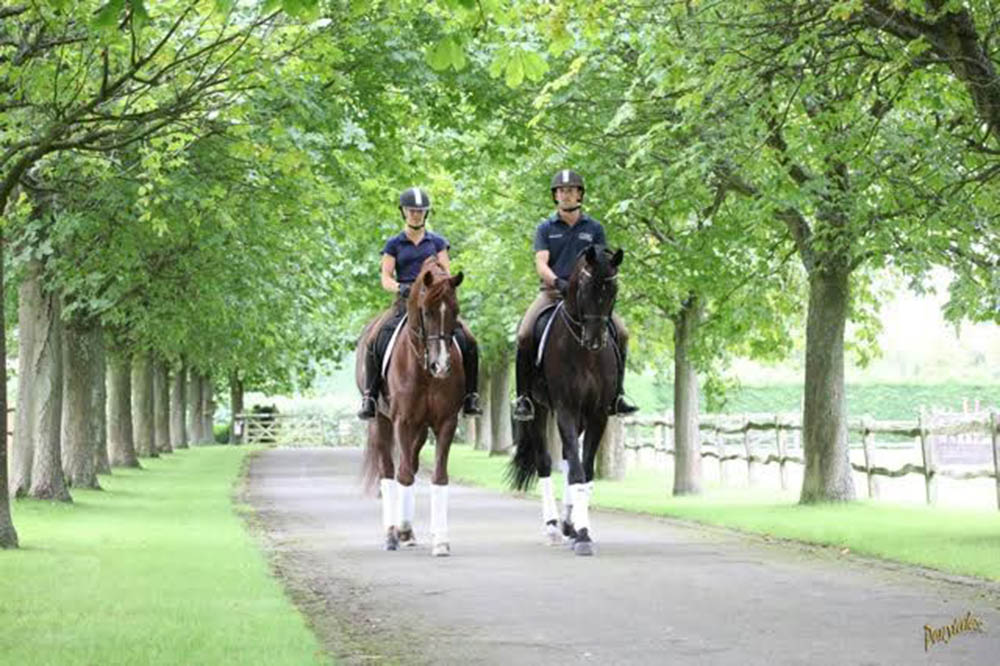
Carolina and Warwick have built a successful business together in Germany. Image supplied by Warwick McLean.
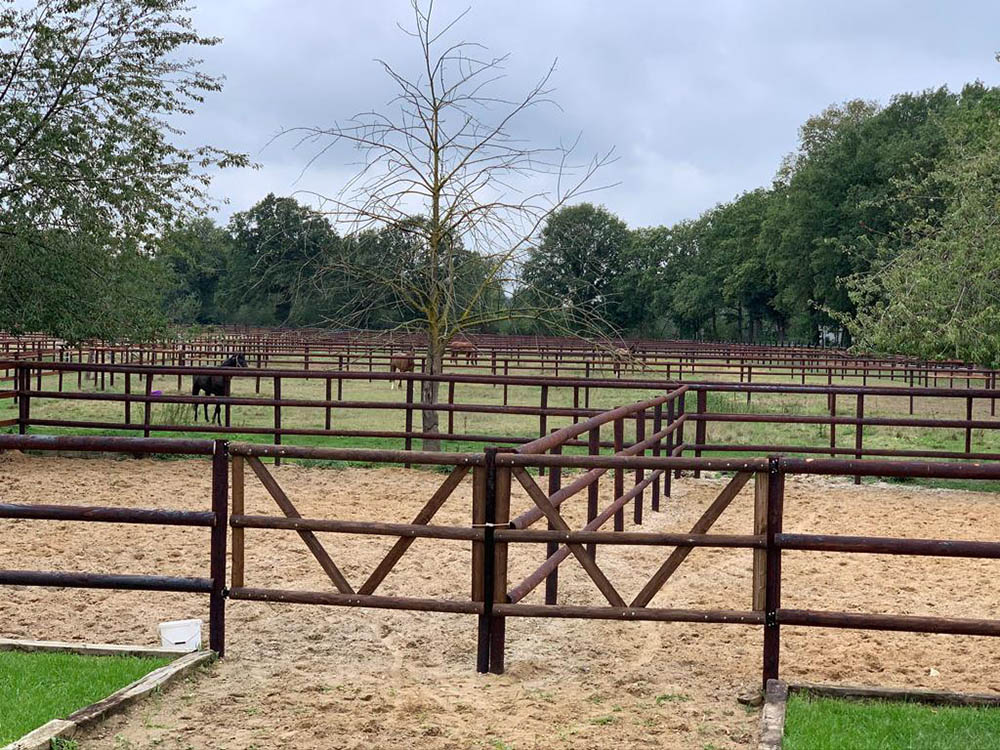
Warwick and Carolina’s newly developed property features five kilometres of post-and-rail fencing. Image supplied by Warwick McLean.
ROGER: Is it difficult over there to get a start at competitions?
WARWICK: To get a start over here you can get a competition licence and that will put you in a level that you can ride. To gain scores and get respect, it’s not easy here. It takes some time to get going at Grand Prix level. We have two sons, Benjamin, who is seven years old, and Fredrik is four years old, and so the focus is on keeping our lifestyle balanced between family, the business and competing.
In the last three years we are now able to focus more on the competitions and it takes a while to get respect, especially being an Australian. When you get going nationally then you get respect internationally. I have to say it was not easy starting at the bottom; if you start with a big professional stable on good horses with top riders and trainers, you seem to step into the points a little easier. We started from the grass roots and it has been a great journey and now we are starting to see the fruits of our growing period. The good horses had to be sold to develop our lives, but now we do not have quite the pressure to sell our good horses as we feel settled with the company now the facilities are all in place.
ROGER: What is your greatest achievement since leaving Australia?
WARWICK: This is a difficult question; competition was not our only goal. Our business, McLean Reitsport, was established in 2013 and has grown so fast. This has given us the opportunity to buy our own horses, our house and now our own stables. At one stage we had 60 horses in training, but as you can imagine mentally and physically that was the highest end and so we have cut down to where there is more quality time with the horses and owners and we now limit this to 45. This steady flow has enabled us to develop good horses for sale.
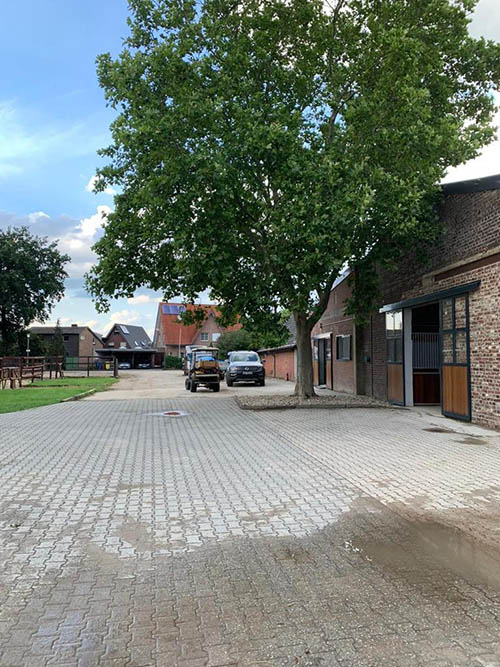
Warwick and Carolina’s property currently accommodates 48 horses. Image supplied by Warwick McLean.
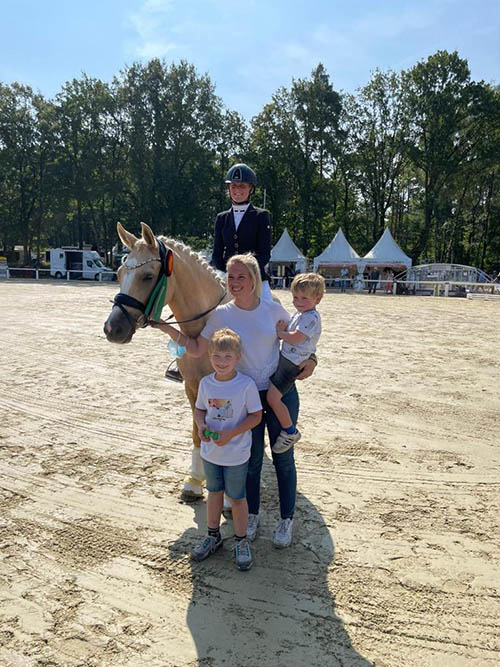
Carolina with children Benjamin and Fredrik. Image supplied by Warwick McLean.
In 2019 we developed our facility with renovations, including 40 new stables, a new surface in the indoor, a new lunge arena and outdoor arena, and five kilometres of post-and-rail fencing as well. We have tried so hard to renovate with the best materials and this property is as we want, and this feeling creates a great work environment. This has led to a great feeling where we really can ride to the best we can. We employ 12 people to run the stable and the training business; without their dedication to the horses and sport there would be no business!
As a team, we help each other and now I have one more win in S-Level (national level Small Tour) to attain the Golden Riding Badge, which is awarded for achieving five high placings (over 68%) in PSG and above and then five wins in S-Level and FEI Small Tour and Big Tour. I hope this will come soon as here in Germany it’s one of the biggest things that you can achieve, and I am very proud to be along the way to gaining this accolade.
ROGER: How many horses do you have and at what levels are you competing them?
WARWICK: Most of the horses that I ride in the shows are my own and I love to ride them. (Grand Prix horse) Hendrix 11 we bought when he was four years old. We have had him a long time, as he was spooky and difficult. My wife has a great eye for seeing the good in all horses and ‘Jimmy’ (Hendrix) we bought inexpensively. He didn’t do well as a young horse, but he is a real giver now, and as much as he is tricky and hot, when he is on my side he is a real treat to deal with. We also have Sir Heinrich and we’ve had him since when we had Jimmy. We sold him, but the owners then put him back in training with me. He started in Grand Prix when he was 10 and he is now 14 years old.
We then have Jack, another Grand Prix horse and I think he can be the best of mine. He had a 69% in the Intermediate A at CDI3* Olomouc. He is by Johnson from a Dimension mother and he has an amazing character. That’s the three Grand Prix horses.
Then at Small Tour there is F-Type OLD who qualified for the 2020 World Young Horse Championships and another, Chinook; the two are not far off a first start at Grand Prix. There are also a few very good young horses. We have 48 horses in the stable at the moment. It’s a big operation and we are always buying and selling horses and have a steady income from those in training.
ROGER: What ever became of the beautiful Sandro Hit stallion, Alessandro?
WARWICK: Alessandro was my first Grand Prix horse and he taught me so much and threw up a few interesting challenges; he was a big mover, but if he could have moved a little shorter and quicker he would have been better. He is now with a younger rider who is using him as a schoolmaster and he loves his life. He was gelded some years ago; as a stallion they are not easy and in retirement it’s hard as well.
Chiaretto was a great horse who also helped me learn so much, including all the Grand Prix movements. He was actually laid to rest only a few weeks ago at the wonderful age of 28.
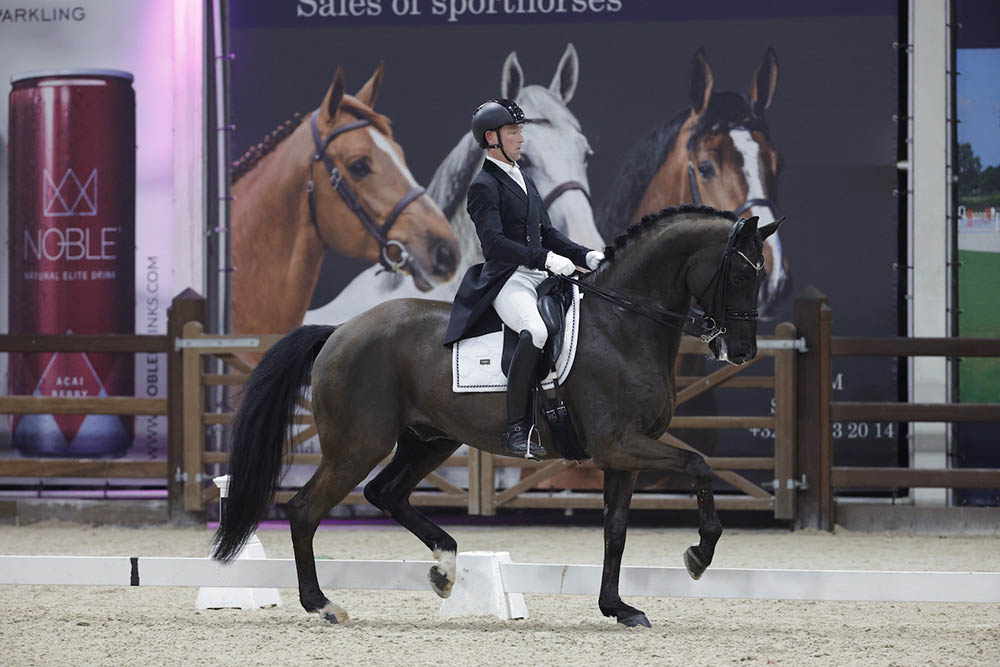
Warwick McLean and Henrix II. Image supplied by Warwick McLean.
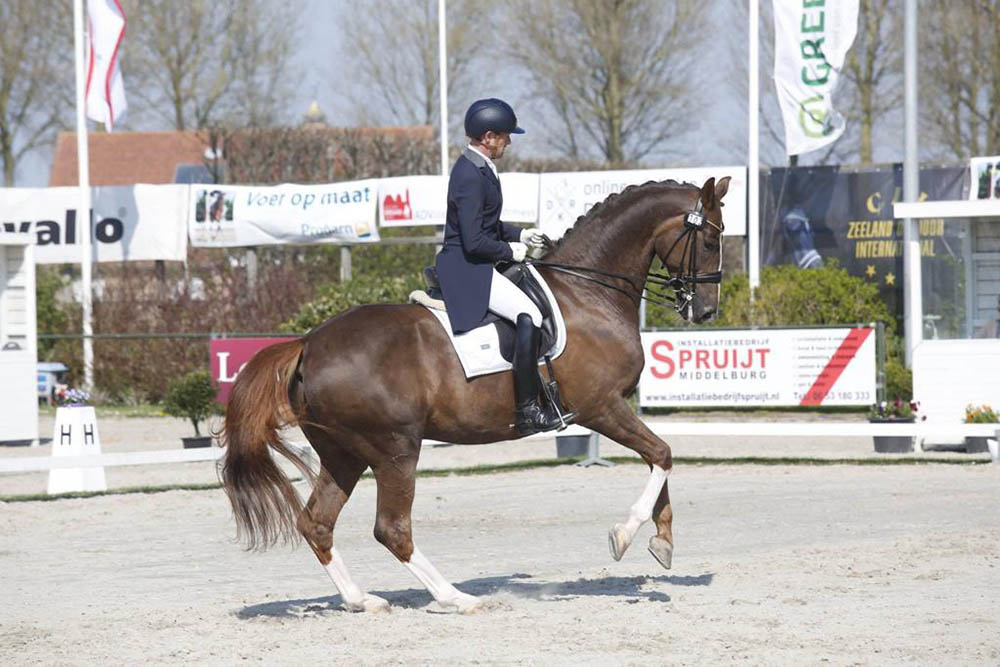
Warwick riding Sir Heinrich. Image supplied by Warwick McLean.
ROGER: Are you also coaching?
WARWICK: I do a lot of coaching and there are many students having lessons. My wife also is a great coach and also does a lot of work with the students who have their horses here. We have under-25 riders and young riders and also many people who simply enjoy the training. Once a fortnight I go to different stables and coach. I learnt a lot from Morten Thomsen and do a lot of work with the piaffe and passage in hand. I love this, and I like to also share my family knowledge about how horses learn (Warwick’s father Andrew McLean is a renowned trainer and leader in equitation science, while his brother Alistair runs the Australian Equine Behaviour Centre in Victoria). The academic side is also rewarding and realising the good and not so good in the learning process. I often go and help with the training and understanding of the young horses with the top riders; this is a big part of my job and of course, as you would know, this is my passion.
ROGER: Tell us a little about Hendrix 11, he’s really improved this year?
WARWICK: Hendrix is a favourite and a special horse now. We bought him for a mere 10,000 euros as a four-year-old and as a young horse he put a few people off, not that he wanted to be bad but he was very reactive. He was tight and nervous in young horse classes and actually had the lowest scores of any horses I have had! He was so reactive and spooky you could hardly get him around the outside of the arena.
“In the last 12 months
he has really grown up.’
In the last 12 months he has really grown up and with experience he has become a wonderful horse to handle and he’s like a family member to us. Over the last two years I have aimed just to ride the test without mistakes; we achieved 70.609% (at Lier CDI3* in March) and still need one more good score to satisfy Australia’s selection criteria for World Championship team consideration (the pair have however ticked off the FEI MER requirements and were named on Equestrian Australia’s recently released FEI nominated entries list of eight combinations). The partnership is now really confident, and this horse has given me great confidence.
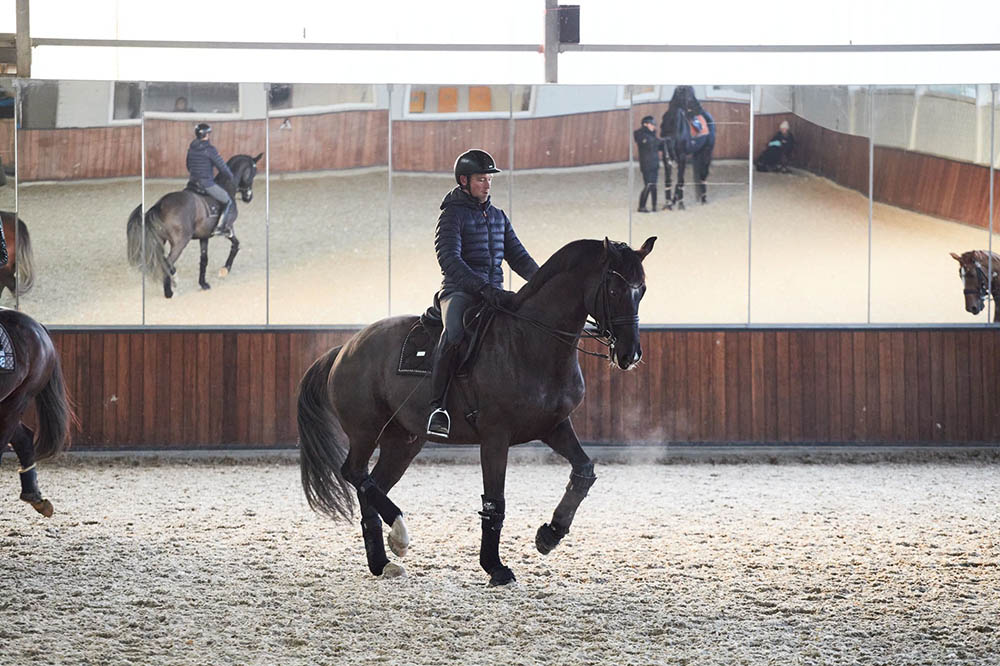
Warwick and Hendrix training at at home. Image supplied by Warwick McLean.
“It was the best I
have done with him and
he was so with me.”
ROGER: Hendrix’s GP PB of 70.609% at Lier CDI3* in March… tell us a little bit about that test?
WARWICK: Lier was a pretty big show and I was a little nervous looking at the rider list. My thought was to ride the best I could and with the first Inter II test a bit spooky and then the next day another familiarisation. He was much better and not so spooky and very relaxed. For the Grand Prix, I saw all the scores with great points and Lyndal Oatley did very, very well (74.370% with Eros). I tried to ride my best and even though he was hot, it was the best I have done with him and he was so with me.
ROGER: You had your first European Big Tour win in May with Hendrix 11 at Olomouc CDI3* in the Special, tell us about this test?
WARWICK: On the first day there in the Grand Prix it was a 68.457% and this was actually the best test we have ridden with no mistakes and smooth. Simone Pearce won on this day (with Fiderdance) and I was second; it was a really fun day. I was last to ride in the Special and I came out and rode a few points above the others and had a great win. However, I felt the Grand Prix was actually the best round.
ROGER: With the success you have recently had, is there anything that you can attribute to this?
WARWICK: My background through my family in equitation science and equine behaviour has been a big influence. I did not always have the easiest horses, but we really learnt from all this and incorporated the ideas of how horses learn. The training methods in Germany are great, but the step of “how do horses learn” is what is sometimes not understood enough, and through many top riders and trainers getting to see our science and understanding, we have shown our methods and in return have learnt and been inspired by others.
Morten is all along the same way; the horse has to understand what he has to do. Having the ability to help fix difficult horses with problems really did give me a big step up over here. It brought new customers as we always had great results with these horses and there is a place for this niche here. As the sport progresses there is a better understanding of the behavioural side and how horses learn, and I am sure this is a good thing.
ROGER: How does it feel to reach the elite level of the sport and be achieving these scores? It must be validating to show that your way of training not only helps ‘problem horses’ but can also produce elite level Grand Prix horses that are seriously competitive.
WARWICK: It was not something that I so wanted, but dressage and horses take you along an interesting path. My wife was the person who supported me along towards the competition arena as that was not my primary purpose in the sport. I sure had some bad results in the beginning, but in hindsight perhaps not bad results… but good learning experiences!
It’s all about breaking the tests down and riding corners and lines, and the best way to get the horse to work through the body is to make sure he’s comfortable and knowing his work. The area where we live is very competitive and to reach this level is a great self-achievement – and also for my father, Andrew McLean, who has done so much work… to see it helping with competition shows its worth.
It is a bonus to be competitive at the Grand Prix but it’s all about finding the horse that wants to work and that has a good engine and brain, and above all suits the rider. To be a good Grand Prix horse, the most important element is to have a great engine. With Hendrix, for instance, that has a good engine, I then only have to help his balance and keep him on my aids and then the feeling is very good.
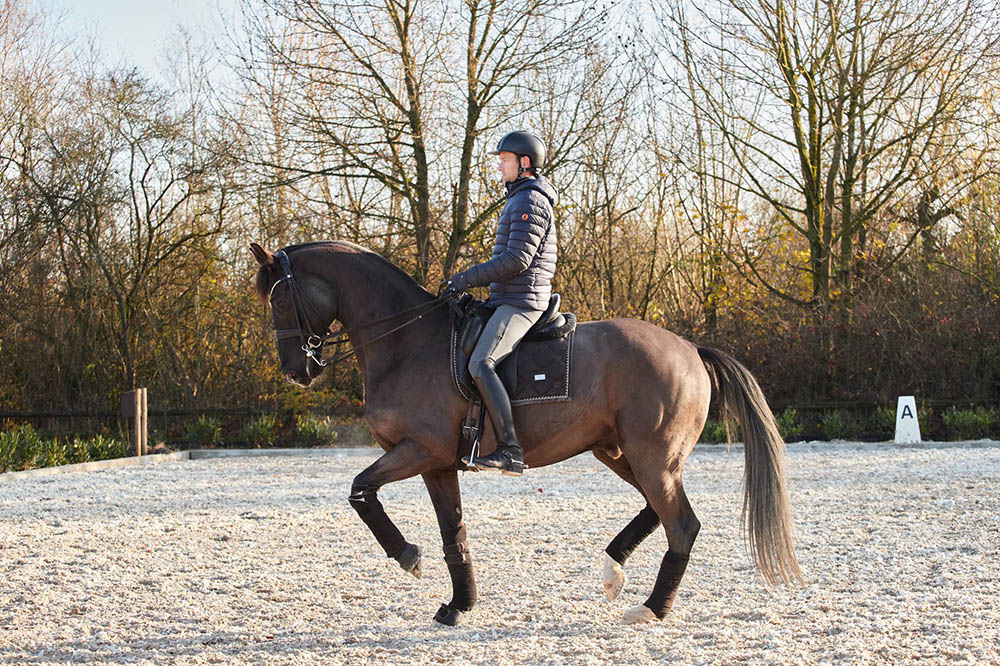
Warwick says Hendrix isn’t always the easiest horse, but he’s showing his talent now at Grand Prix. Image supplied by Warwick McLean.
ROGER: Hendrix 11 is in the running for World Championship selection, having been named on Australia’s eight-combination FEI nominated entries list. Ideally you need one more 69%+ GP score to meet Australia’s selection criteria; unfortunately, things didn’t go as planned at Aachen where you would have been hoping to achieve that score?
WARWICK: We were named on the CDIO5* Nations Cup team at CHIO Aachen, however unfortunately Hendrix did not trot up well. The trot up was done on a very hard surface; it often is on the softer competition surface. He isn’t the easiest horse to trot up as he is full of adrenaline and he doesn’t have the world’s best looking feet, but that’s just him. It was difficult as the trot up was on a slope and he was not happy about the road and the slope and with the tension he had, it was not easy.
Hendrix is all good and it’s only his first season, so we will work through this. You never stop learning in this sport and I was extremely sad to not be able to compete as there is no question that Aachen is the best show in the world and it was not only sad for me, but I did feel so sorry for all the people behind our team that are on the journey with me… my wife who is so devoted to the horses and the sport, and the myriad of people that are so much part of our life, such as Emily Symonds who came over from home to help us for three months and was grooming for us at Aachen.
The support from the Australians here in Aachen has been wonderful and I am sure that we will get another chance at this wonderful competition, hopefully next year! As I said, you live and learn, and I look forward to our next competition with positivity. The team vets will visit and check Hendrix, but he is fine and this was just one of those things. Horses are great levellers and when you think all is going so well, there is always a curve-ball to set things askew. Well done to the Aussies at Aachen, they make us all feel so proud!

Warwick has built a special partnership with Hendrix. Image supplied by Warwick McLean.
ROGER: What is it that you miss about Australia?
WARWICK: I think about home all the time and I miss the lifestyle and the open-mindedness of the people there, and of course my family and friends. Normally we go back twice a year; with Covid it was so tough not to be able to go back. During that time, we renovated the property so in a sense that was great timing. My wife is from Finland and also away from her own country, and so we are both here without family, but we have a great network and extended family here. We feel we have integrated well. If you want to do well here, you need to integrate. Above all, I so miss the Aussie lifestyle and the ease of life at home!EQ
YOU MIGHT ALSO LIKE TO READ:
Big Australian Selection Changes – Equestrian Life, July 2022
